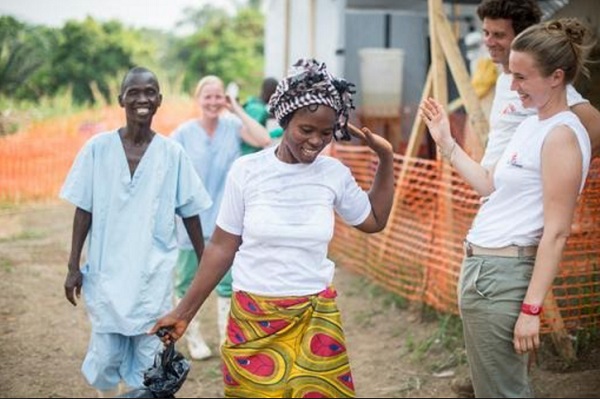
On Thursday 14 January 2016, Médecins Sans Frontières Luxembourg joined other worldwide branches of the association in celebrating 42 days without any new Ebola virus contaminations in Liberia.
The international humanitarian organisation has called for the medical community, which lost at least 500 professionals during the outbreak, to learn from the epidemic. These words echoed a sentiment previously issued by Luxembourg's Health Minister, Lydia Mutsch, who at a December EPSCO Council meeting stated "In the future, it is important to exchange best practices in the field of prevention and treatment of the Ebola viral disease, define the medical evacuation capacity of the EU and agree on the provision and mode of operation of mobile teams on site."
Médecins Sans Frontières condemned the international community in its 2014 report, claiming that the slow reaction from capable parties meant that the three worst-affected countries were all but left to be consumed by the virus for over seven months.
"Today is a day of celebration and relief that the epidemic is finally over," Joanne Liu, International President of MSF, commented Thursday. "We all must learn from this experience to improve our response to future epidemics and neglected diseases. The Ebola response was not only limited by the lack of international resources, it was also by a lack of political will to deploy rapid assistance to the populations concerned. The needs of patients and affected communities must remain at the heart of any response and take precedence over political interests."
"We must congratulate all the people who tirelessly helped put an end to this unprecedented devastating epidemic, and we must also remember the many health professionals who lost their lives fighting Ebola," said Brice de le Vingne, Director of Operations. "This devastating epidemic hit nearly 40 years after the first discovery of Ebola in 1976, but the lack of Ebola research and development remains, and even today, after clinical trials and the end of the epidemic, there is still no effective treatment. We must also obtain a license for a new vaccine that has been developed."
MSF was heavily involved in operations, employing nearly 4,000 national and 325 international staff in the three affected countries to fight the epidemic at the height of its impact. Over 10,000 patients in total were admitted to MSF treatment centres, 5,226 of which were confirmed positive for Ebola, and the organisation has dedicated more than €96 million to its Ebola response.
Faced with such an unpredictable epidemic, MSF stated that it is crucial to remain vigilant and ready to respond in the region to new cases, as well as implement a monitoring and rapid response system. Ebola survivors are a particularly vulnerable group, facing continual medical challenges such as joint pain, chronic fatigue and impaired vision and hearing. They are also the victims of stigma within their communities and require specific and specialised care. MSF has invested in opening survivor clinics in Liberia, Sierra Leone and Guinea, to provide both medical and psychological care packages, as well as protection against stigma.
"Throught the epidemic, I saw how communities have been torn apart," recalled Hilde de Clerck, an MSF epidemiologist who worked in Liberia, Guinea and Sierra Leone. "At first, the response of the international medical community was paralysed by fear. It was a terrible experience to be left to ourselves and be constantly running behind the epidemic. But it was also impressive to see the mobilisation of all our medical staff, and fortunately other international actors were finally involved. In the case of a future outbreak, the world must build the capacity to intervene faster and more efficiently."
Photos by MSF








